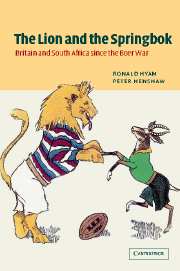Book contents
- Frontmatter
- Contents
- List of illustrations
- List of tables
- Preface
- Acknowledgements
- List of abbreviations
- 1 The uneasy special relationship: dynamics and divergencies
- 2 Breakdown: into war, 1895–1899
- 3 Post-war: the myth of magnanimity, 1905–1907
- 4 African interests and the South Africa Act, 1908–1910
- 5 ‘Greater South Africa’: the struggle for the High Commission Territories, 1910–1961
- 6 The economic dimension: South Africa and the sterling area, 1931–1961
- 7 Britain, the United Nations, and the ‘South African disputes’, 1946–1961
- 8 The political consequences of Seretse Khama and Ruth, 1948–1952
- 9 Containing Afrikanerdom: the geopolitical origins of the Central African Federation, 1948–1953
- 10 Strategy and the transfer of Simon's Town, 1948–1957
- 11 The parting of the ways: the departure of South Africa from the Commonwealth, 1951–1961
- 12 Enfeebled lion? How South Africans viewed Britain, 1945–1961
- 13 Springbok reviled: some British reactions to apartheid, 1948–1994
- Epilogue The relationship restored: the return of the new South Africa to the Commonwealth, 1994
- Select bibliography
- Index
5 - ‘Greater South Africa’: the struggle for the High Commission Territories, 1910–1961
Published online by Cambridge University Press: 03 December 2009
- Frontmatter
- Contents
- List of illustrations
- List of tables
- Preface
- Acknowledgements
- List of abbreviations
- 1 The uneasy special relationship: dynamics and divergencies
- 2 Breakdown: into war, 1895–1899
- 3 Post-war: the myth of magnanimity, 1905–1907
- 4 African interests and the South Africa Act, 1908–1910
- 5 ‘Greater South Africa’: the struggle for the High Commission Territories, 1910–1961
- 6 The economic dimension: South Africa and the sterling area, 1931–1961
- 7 Britain, the United Nations, and the ‘South African disputes’, 1946–1961
- 8 The political consequences of Seretse Khama and Ruth, 1948–1952
- 9 Containing Afrikanerdom: the geopolitical origins of the Central African Federation, 1948–1953
- 10 Strategy and the transfer of Simon's Town, 1948–1957
- 11 The parting of the ways: the departure of South Africa from the Commonwealth, 1951–1961
- 12 Enfeebled lion? How South Africans viewed Britain, 1945–1961
- 13 Springbok reviled: some British reactions to apartheid, 1948–1994
- Epilogue The relationship restored: the return of the new South Africa to the Commonwealth, 1994
- Select bibliography
- Index
Summary
The Union of South Africa Act had the effect of uniting South Africa but of dividing southern Africa. The partitioning of the whole area, with imperial responsibility retained in the Rhodesias and Nyasaland, and in the High Commission Territories of Basutoland, Bechuanaland, and Swaziland, was not intended to be a permanent arrangement. The Union as formed was expressly regarded both in London and Pretoria as a provisional union. The Act of 1909 laid down a procedure for the incorporation of Rhodesia, and the Schedule prescribed the terms for a possible future transfer of administration in the High Commission Territories. However, the expectations of 1908–10 were not realised, and the formal political expansion of the Union in southern Africa did not materialise.
Perhaps the fundamental reason for this ‘unconsummated Union’ was determined in 1908. The British government's decision to retain control of the High Commission Territories after Union meant that the first setback to dreams of a Greater South Africa were registered even before the Union came into being. This important decision conflicted with the known wishes of the white South African leaders. The general strategy of the British government in 1908–9 was well expressed by Winston Churchill, who had just moved from the Colonial Office to the Board of Trade. He wrote to the colonial secretary, Lord Crewe:
The only securities which the natives have are first of all our power to delay by a variety of methods the handing over of the Protectorates. […]
- Type
- Chapter
- Information
- The Lion and the SpringbokBritain and South Africa since the Boer War, pp. 102 - 117Publisher: Cambridge University PressPrint publication year: 2003



